Unlocking growth: Moglix’s strategic entry into the Middle East
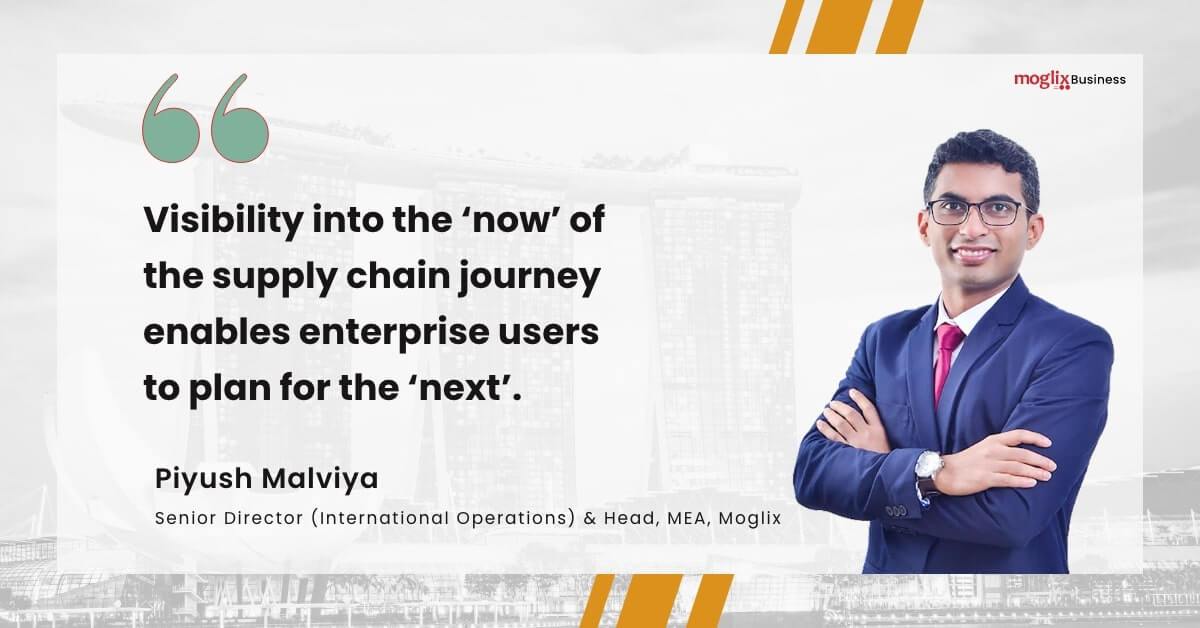
Unlocking growth: Moglix’s strategic entry into the Middle East
EXCLUSIVE: In an in-depth discussion, Piyush Malviya of Moglix talks about the challenges of the Middle East’s logistics, procurement and industrial sectors, and how technology plays an integral role in shaping these segments
Moglix, a global leader in B2B e-commerce and supply chain solutions, has recently entered the Middle Eastern market. This move marks a pivotal chapter in Moglix’s growth story, leveraging the region’s digital transformation initiatives and supportive regulatory framework.
In an insightful conversation with Logistics Middle East, Piyush Malviya, Vice President and Head of the MEA region at Moglix, delves into the company’s plans and strategic vision for the Middle East. Malviya shares insights on how Moglix has tailored its business model and supply chain strategies to address the unique challenges of the Middle Eastern logistics and industrial sectors. Through these strategic initiatives, Moglix aims to play a pivotal role in catalysing the region’s transition to a digital economy and setting new benchmarks in supply chain excellence.
Strategic entry into the Middle East
Moglix’s entry into the Middle Eastern market represents a strategic milestone for the company, driven by a keen understanding of the region’s growth potential and innovation landscape. Malviya articulates the core reasons behind this expansion, highlighting the region’s alignment with Moglix’s supply chain capabilities. “Our entry into the Middle East was driven by the strategic fit between the region’s potential for growth and innovation and our supply chain capabilities—both digital and on the ground,” says Malviya.
The decision to establish a presence in the Khalifa Port Free Trade Zone (KPFTZ) was influenced by the UAE’s commitment to digital transformation and supportive regulatory framework. Malviya notes, “Based on the UAE’s commitment to digital transformation, the region boasts a supportive regulatory framework and government initiatives conducive to the growth of tech companies.”
The MENA region’s growing B2B e-commerce market presents a significant opportunity for Moglix. With the market expected to reach a valuation of $2,293 billion by 2030 and the UAE e-commerce market poised to grow from an estimated $5.5 billion in 2024 to $8 billion by 2026, the timing of Moglix’s entry is strategic. “These factors seamlessly align with our vision to positively transform the traditional B2B landscape and catalyse the nation’s transition into a digital economy,” Malviya adds.
Moglix’s operational base in Abu Dhabi and Dubai, along with its network of regional warehouses, serves as a strategic hub for customer fulfilment across the Emirates. The launch of their B2B e-commerce platform underscores their commitment to offering a comprehensive digital catalogue. “Through the launch of our B2B e-commerce platform’ moglix.ae,’ we are now offering a digital catalogue which encompasses 500,000 industrial products across 50+ categories,” explains Malviya.
Moglix plans to extend its reach across the GCC, targeting lucrative markets and leveraging opportunities in various sectors such as manufacturing, real estate, FMCG, government, and education. Malviya emphasises the importance of strategic partnerships and consumer-centric solutions in achieving long-term success, “By synergising strategic partnerships and consumer-centric solutions, we have positioned ourselves for long-term success within the Middle East’s dynamic B2B e-commerce ecosystem.”
Adapting to the Middle Eastern market
Navigating the complexities of the Middle Eastern logistics and industrial sectors requires a nuanced approach tailored to the region’s unique dynamics. Moglix has customised its business model and supply chain strategies to meet these specific needs, demonstrating an understanding of the local market. Malviya explains, “The unique nature of the logistics and industrial sectors in the Middle East is defined by the presence of multiple specialist solution providers across diverse functions of the supply chain ecosystem.”
Moglix’s approach in the Middle East is seen by its holistic supply chain solutions, which integrate a wide array of online and onsite capabilities. Malviya elaborates, “We are here as a holistic supply chain solutions provider that combines all these capabilities—online and onsite—on one platform. Our end-to-end offerings across the P2P cycle include indirect and direct procurement, supply chain SaaS suite, supplier network, multimodal logistics, and warehousing.”
The company’s playbook for customising solutions for large corporate customers is based on creating industry-specific end-to-end solutions. Whether in FMCG, food & beverage, retail, textiles, or the automobile sector, Moglix has developed case studies of successful implementations. “We have built a case study of end-to-end solutions for each industry vertical,” Malviya notes, emphasising the importance of tailored approaches.
Collaborations with local businesses and government
Forging strong partnerships with local businesses and government entities has been a cornerstone of Moglix’s strategy in the Middle East. These collaborations are pivotal in enhancing Moglix’s operational capabilities and bridging gaps between local expertise and global markets. Malviya underscores the significance of these partnerships, stating, “The end goal of these supply chain localisation initiatives is to zero down the gaps with both our large corporate enterprise customers in the Middle East and those across the world who are looking up to the Middle East as a strategic sourcing hub for the global manufacturing supply chain.”
Moglix has established numerous local-level partnerships with MSMEs, banks, logistics services providers, supply chain financing platforms, and payment gateway operators. Each partnership brings distinct value, facilitating a seamless and efficient supply chain process. “We have partnered with local MSME and OEM suppliers for indirect procurement and with multimodal logistics solution providers in the region,” Malviya explains. “By doing so, not only are we fulfilling the procurement mandate of large enterprise buyers in the region, but also putting together the largest stack of local managerial, technical, and logistical know-how.”
These partnerships are also instrumental in Moglix’s efforts to integrate local business regulatory frameworks and adhere to the ESG charter for large corporate enterprises outlined by local governments. This alignment ensures that Moglix’s operations comply with local regulations and sustainability goals. Malviya notes, “At the heart of these local business partnerships is the business regulatory framework and the ESG charter for large corporate enterprises as laid out by local governments in the Middle East.”
Additionally, Moglix’s collaboration with payment gateway integrators is crucial for offering a seamless B2B e-commerce experience tailored to the regional market. This includes adopting local currency, technology, regulatory frameworks for cybersecurity, and fit-for-audit data governance. “Our partnership with payment gateway integrators in the region is key to offering a seamless B2B e-commerce experience,” Malviya highlights. This localised approach not only enhances the customer experience but also ensures compliance with regional standards and regulations.
Technological tools and innovations
At the heart of Moglix’s operations in the Middle East is a technological framework designed to enhance efficiency, transparency, and reliability across the supply chain. Malviya elaborates on the central role of technology in Moglix’s strategy, stating, “At the heart of the Moglix operating system for B2B commerce is technology. We have put together an operating system that enables material, data, and fund flow through a single green channel corridor so that we are always alongside customers.”
Moglix’s technology stack is built on three key pillars: source-to-pay, intelligent contracting, and B2B e-commerce. These components work together to provide real-time visibility and seamless coordination across the supply chain. “Visibility into the ‘now’ of the supply chain journey enables enterprise users to plan for the ‘next’,” Malviya explains. “In other words, the real-time coordinates of the physical movement of processes, goods, and logistical assets, in combination with our artificial intelligence and machine learning capabilities, set the tone for de-risking transactions and unclogging bottlenecks.”
The source-to-pay solution is a cornerstone of Moglix’s technological offerings, providing procurement and logistical tracking capabilities. Malviya shares a practical application of this technology, “Our source-to-pay solution is used by a leading EPC infrastructure enterprise with 4,000+ users across 500 sites every day to seamlessly purchase industrial goods and track the logistical coordinates of their consignments.”
Intelligent contracting is another critical aspect of Moglix’s tech stack, which is designed to streamline procurement processes and ensure efficient contract management. “Our intelligent contracting solution is used by one of the world’s largest FMCG behemoths to draft and edit contracts for direct procurement, ensuring that millions of customers across the world can access the goods they need every day,” Malviya notes.
Moglix’s B2B e-commerce solutions further enhance the customer experience by providing a seamless online platform for purchasing industrial products. This capability is particularly beneficial for large-scale enterprises in the region. “Our B2B e-commerce solutions are used by a multinational mine-to-market metal and oil & gas conglomerate to offer a seamless online customer experience for the purchase of zinc, silver, copper, etc.,” Malviya highlights.
The scalability and customizability of Moglix’s technology stack allow the company to replicate successful use cases and create tailored supply chain solutions for customers in the Middle East. “Our technology stack is granular and scalable, implying that we can replicate successful use cases to create a customised supply chain SaaS solution for our customers in the Middle East on demand,” Malviya explains.
Moglix’s strategic entry into the Middle Eastern market exemplifies the company’s vision to leverage digital transformation and drive innovation within the region’s logistics and industrial sectors. Through strategic partnerships, tailored business models, and cutting-edge technology, Moglix is well-positioned to address the unique challenges of the Middle Eastern market.
As Moglix continues to expand its footprint across the GCC, its holistic approach to supply chain management promises to set new benchmarks in the B2B landscape, fostering a resilient and efficient supply chain ecosystem in the Middle East.
Need for a holistic strategy to maximize ROI across the supply chain

Need for a holistic strategy to maximize ROI across the supply chain
The immediate purpose of supply chain lies in delivering a customer experience that satisfies expectations and fulfils contractual obligations between the supplier and the buyer, with an ultimate outlook of increasing market share while mitigating risk and reducing costs. This is a demand-driven business model; one that functions as a blueprint for creating an integrated supply chain system where customers’ demand and their satisfaction guides day-to-day decisions and longer-term market strategy.
To this effect, there are various key supply chain links that must be addressed as a part of a holistic strategy for meeting customer demand and optimising the processes of procurement, production, distribution, and inventory-keeping.
Maintaining Organizational Agility
Envisioning a sustainable supply chain management system must begin with an initial and pervasive attitude of being quick and efficient in responded to both expected and unexpected disruptions.
“Managing the key supply chain links is the core of adopting a customer-focused approach to business, ultimately leading to satisfying customer demands, and fulfilling contracts to the letter.”
adds Piyush
Moglix – Reimaging manufacturing infrastructure in the UAE
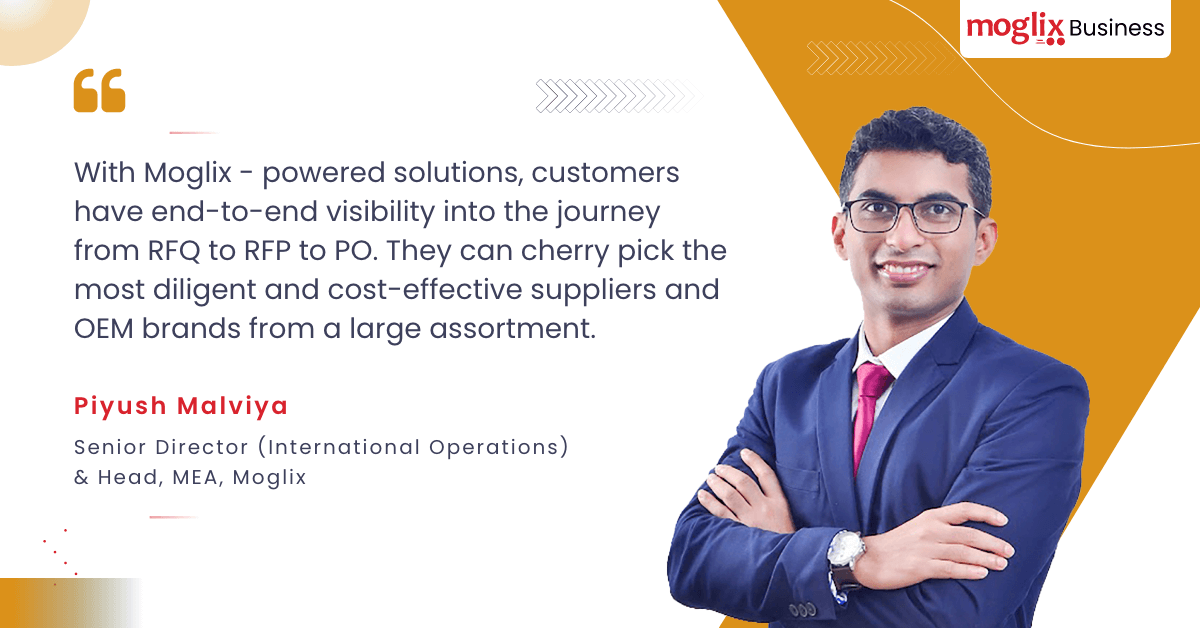
Moglix – Reimaging manufacturing infrastructure in the UAE
UAE lies at the crossroads of the manufacturing supply chain routes that crisscross across the world. Technology penetration in the Middle East region has already attained a threshold level which is visible from the success of B2C e-commerce. So, technology adoption is not a challenge. Rather the challenges we have been resolving in the Middle East are those related to limited product assortment of suppliers, costs of distribution, warehousing, and logistics, and enabling manufacturers realize their mandate for creating end-customer value.
Since launching in the UAE, we have channeled existing partnerships to secure symbiotic collaborations across manufacturers, suppliers, distributors, specialists, and consultants. The B2B e-commerce platform, moglix.ae, provides a catalog of over 500,000 industrial products spanning 50+ categories. It provides insights on metrics like the expected time of arrival, lead time, and the turnaround time. Such data enables agility at scale in procurement decision-making frameworks for customers and suppliers. They ensure that end-to-end supply chains can withstand macroeconomic shocks and disruptions.
Silver bullet to mitigate Supply Chain Disruptions
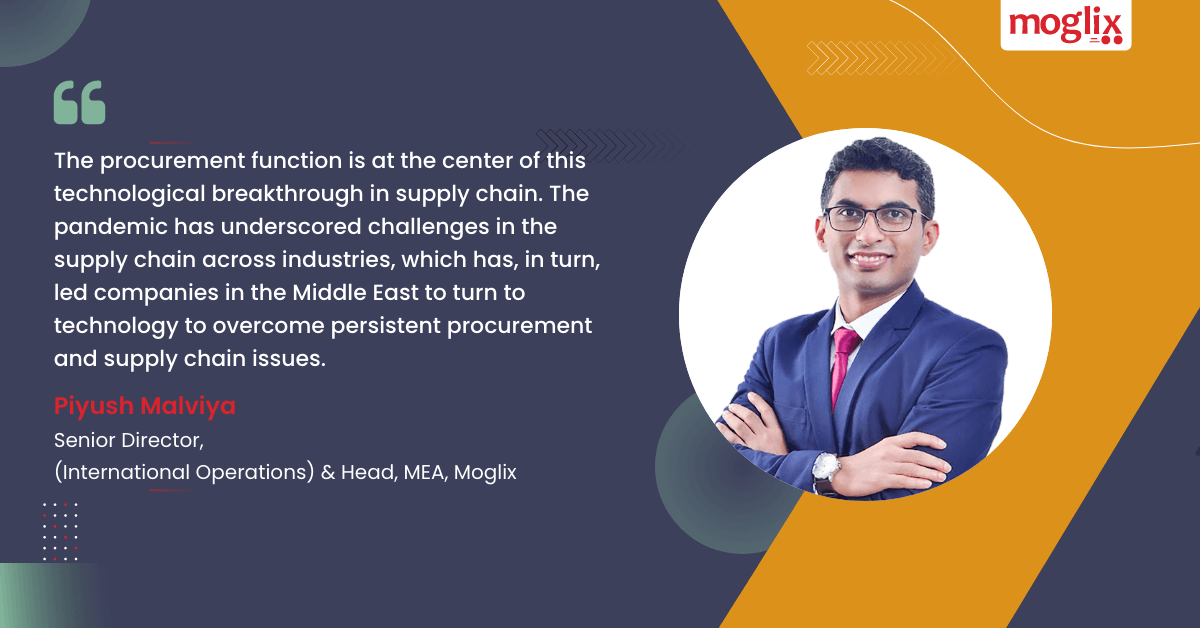
Silver bullet to mitigate Supply Chain Disruptions
The manufacturing sector in the middle east, prior to the pandemic, relied on a highly fragmented supplier base, and with a few exceptions, it wasn’t standard practice to replace the many suppliers with a few or just one. A manual and relationship-led procurement and supplier management process meant limited adoption of digital tools such as ERP systems. COVID-19, though has been an epic tipping point for the intense digital transformation of the supply chain industry in the Middle East region.
According to market analysts Ventures Middle East, digital transformation initiatives in supply chain have become increasingly powerful and businesses that make use of it are expected to stay resilient. The Gulf Cooperation Council (GCC) countries are expected to continue to invest heavily in digital transformation solutions in supply chain as it tries to enhance its position as a hub for international commerce in a pandemic scenario as well.
Well-planned and well-implemented digital transformation offers the opportunity to leapfrog to a new, digitally-enabled future ahead of competition, crises, and most importantly, customer expectations.
Next for Digital Supply Chain Transformation: Connectivity, Convenience, and Analytics
The dramatic shift towards a digital supply chain has been all too evident post-pandemic, with a full realization that it not only makes them more competitive and resilient – there is also an economic upside.
Moglix raises USD 250 Million at USD 2.6 Billion valuation

Moglix raises USD 250 Million at USD 2.6 Billion valuation
Dubai, UAE: Moglix has raised $250 Million in its latest Series F funding round, at a valuation of $2.6 Billion. This investment was led by Tiger Global and Abu Dhabi-backed Alpha Wave Global with Hong Kong-based Ward Ferry coming on board as a new investor. Early investors, who had invested in Moglix during the seed stage have seen an 80X return on their investment in this B2B commerce pioneer.
One of India’s largest and fastest-growing B2B Commerce companies, Moglix provides solutions to more than 500,000 SMEs and 1000+ large manufacturers across India and the UAE. Moglix has a supply chain network of 16,000+ suppliers, 40+ warehouses, and logistics infrastructure. Moglix works with manufacturing and infrastructure companies to transform their end-to-end supply chain, from procurement to distribution. In May 2021, Moglix became the first B2B Commerce unicorn in the manufacturing sector, raising $120 Million.
Moglix debuts in the UAE
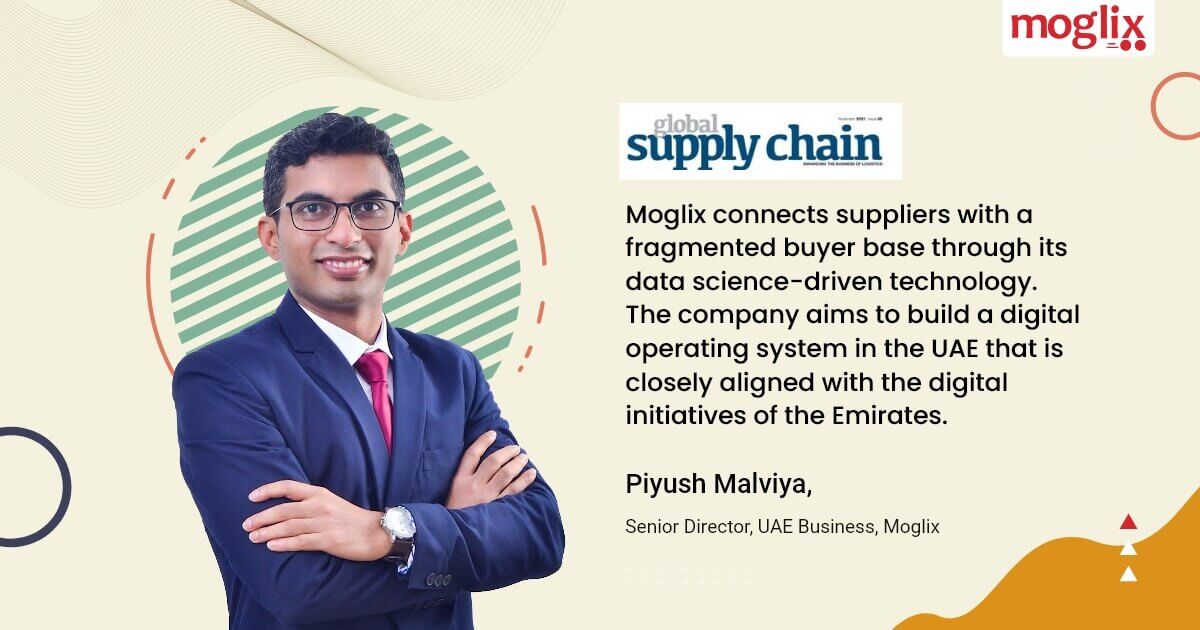
Moglix debuts in the UAE
Moglix connects suppliers with a fragmented buyer base through its data science-driven technology. The company aims to build a digital operating system in the UAE that is closely aligned with the digital initiatives of the Emirates.
India’s Moglix, the online industrial business-to-business marketplace, with a network of more than 16,000 suppliers, recently set up base in Abu Dhabi’s Kizad after raising US$ 120 million in its latest funding round that valued the company at US$ 1billion. The company operates out the Khalifa Port Free Trade Zone in Abu Dhabi and plans to expand operations across the Middle East.
“We are excited to enter the UAE, a gateway to the GCC and a major hub of global commerce and innovation with a vision to transform into a digital economy,”
affirmed Rahul Garg, Founder and Chief Executive, Moglix.
The macroeconomic fundamentals of the UAE are very strong. While we have launched our business in the UAE recently, we have been building our on-ground capabilities, onsite footprint, and team strength since 2020. We have been customizing our supply chain technology and internal business processes. Moving forward we aim to expand our breadth of offerings in the region and create successful customer collaborations that can serve as case studies for the custom supply chain requirements of different industries. The major challenge for us is the status quo and we are on track to enabling supply chain transformation in the B2B space through the new normal that is emerging.
We have been doing the groundwork in the UAE, building our onsite supply chain capabilities of supplier network, warehousing, and logistics. We are strategically positioned in KIZAD with close proximity to Dubai and Abu Dhabi. UAE is the hub of international trade and cross-border supply chains in the GCC. We aim to leverage our on-ground capabilities in the UAE to scale up our footprint across the entire.
Moglix looking to disrupt business procurement in the UAE
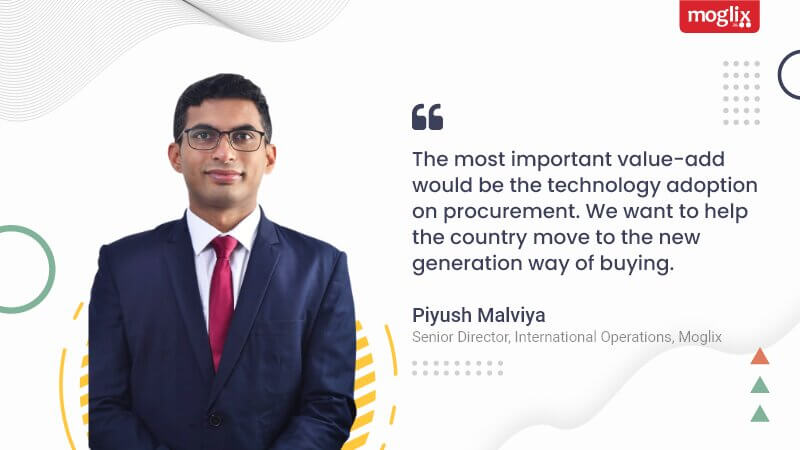
Moglix looking to disrupt business procurement in the UAE
Moglix is looking to bridge that gap between business and consumer buying and introduce technology to business procurement.
The Singapore-based online business-to-business procurement platform recently expanded to Abu Dhabi and Dubai with the ambition of solving the region’s procurement challenges, the result of outdated practices.
“While consumer-tech is benefiting from digital technologies and innovations, business-tech is still largely unchanged from what it was ten years ago. Business procurement still follows the same procedures of getting multiple quotations from the market and going through all the administrative work,”
said Malviya.
The online platform will also be deploying more of its solutions in the region, such as procurement options for the construction and manufacturing sectors.
Moglix Expands Business to the UAE
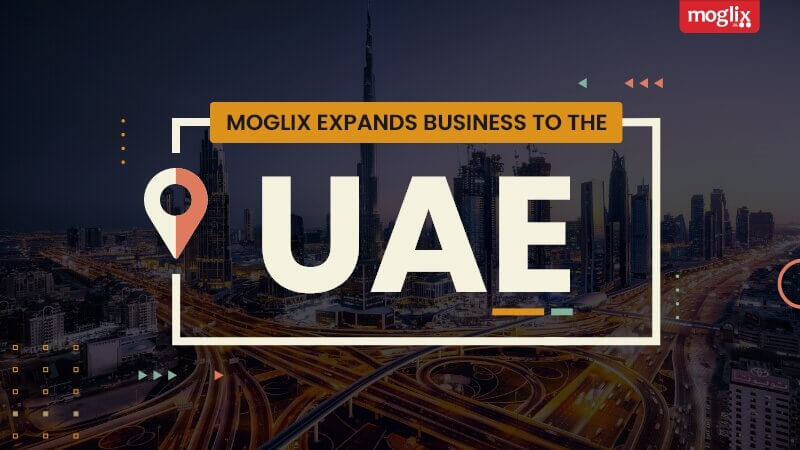
Moglix Expands Business to the UAE
Moglix enters the UAE as part of its global expansion plans. We will enable enterprises across the Manufacturing, Oil & Gas and Infrastructure sectors to transform their end-to-end supply chain, from procurement to distribution. Through our digital platform, supplier and buyer network, and logistics strength,
we bring down cost, enhance sales, improve operational efficiency, and make the supply chain touchless.
“We are excited to enter the UAE. UAE is a gateway to the GCC and a major hub of global commerce and innovation with a vision to transform into a Digital economy. The UAE government’s mission and investment in digital upskilling is unmatched and we are looking to collaborate with local talent to jointly drive digital transformation. Our vision to build the operating system for commerce is closely aligned with the Digital UAE initiative to make the UAE a Smart Country and we are looking forward to empowering stakeholders to achieve this goal.“
says Rahul Garg, CEO and Founder, Moglix
Explore Moglix B2B E-Commerce Portal
Moglix recently raised its Series E round of funding led by Falcon Edge Capital through their Abu Dhabi based Alpha Wave Ventures, becoming the first B2B Commerce unicorn in the manufacturing sector, with a total funding of $220 Million and a valuation of $ 1 Billion
Startups fight COVID-19: Moglix fights against India’s oxygen crisis
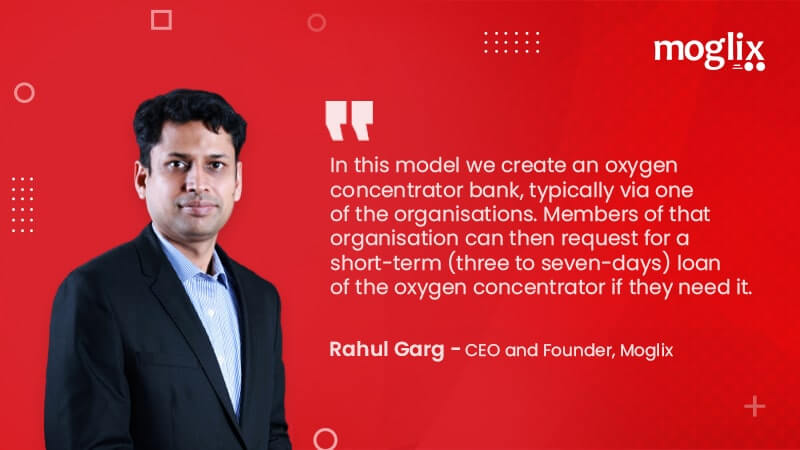
Startups fight COVID-19: Moglix fights against India’s oxygen crisis
As India battles the deadly second wave of the COVID-19 pandemic, startups, corporates, and individuals are all rallying together to ensure that they are doing their bit. The biggest challenge in the second wave is the dearth of oxygen cylinders along with crucial medicines.
“We estimate the need for at least 100,000 oxygen concentrators across India. However, each person buying an oxygen concentrator for themselves is not scalable and will lead to inefficient distribution of precious resources. Most people will find the cost prohibitive and the requirement short-lived (one to two weeks),”
Rahul says.
B2B ecommerce startup Moglix has been supplying PPE, oxygen concentrators, oximeters, thermometers etc. to essential goods and services companies to ensure their employees are protected. It has also distributed 15 million+ PPE kits and safety items amid this pandemic.
The startup has developed a “group sharing model” for increasing the impact of every oxygen concentrator by 100x, and is enabling organisations, NGOs, trusts, and RWAs to create oxygen concentrator banks for patients and providing a safety net for their communities.
“If your organisation would like to join us in this mission to provide a safety network to corona warriors, please write to us at info@moglix.com. We can help you set up similar network-based models for your organisation and share our learning/ SOPs. Let us come together to do our bit in this fight,”
Rahul Adds.
How Technology is Accelerating Value Creation in the Manufacturing Sector
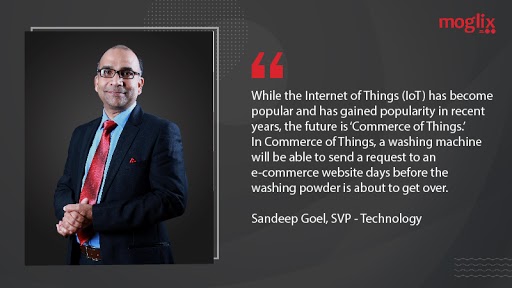
How Technology is Accelerating Value Creation in the Manufacturing Sector
Sandeep Goel, SVP- Technology shares his thoughts on how technology will pave the way for a futuristic manufacturing sector, at the Future Of Work Summit organized by YourStory.
He talks about the impact of COVID-19 and how it transformed the manufacturing sector in India. The pandemic accelerated the shift that Make in India has enabled in the sector, bringing about transformations, both physical and digital, boosting the self-reliance of India’s manufacturing sector.
Sandeep outlined key challenges that continue to persist in the sector, highlighting the need for streamlining order processing, and transaction data integration, and lack of intuitiveness when it comes to the application ecosystem.
He highlighted the role of technology in altering the future of manufacturing. How rapid advancements in digital technologies are revolutionizing business supply chains, and are poised to transform how the procurement function delivers value and enables swift decision-making in the ecosystem. He also talked about the need for constant connectivity as the norm, and how sensors are bringing devices and machines to life in the Internet of Things.

